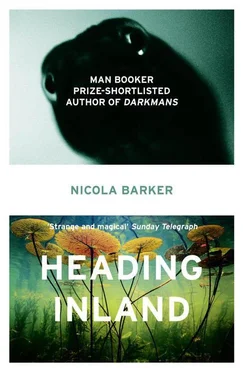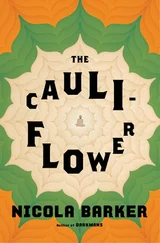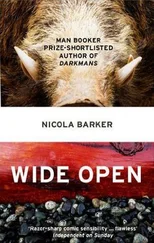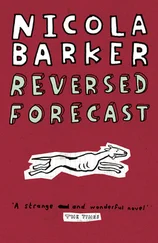Ralph led Tina towards a church — In Rome, she thought, what else? — and up some steps. At the top, slightly out of breath, he turned and proclaimed, quite seriously: ‘Here lies dust, ashes, nothing.’
‘What?’
‘It’s written on the wall,’ he said. ‘Inside. I kind of liked it.’
She moved towards the entrance. ‘No,’ he said, turning from her, ‘not there. This way.’
Ralph cut to the right, through a small door and down into rock, into a clammy darkness.
The stairs were steep. She followed. ‘The friars here,’ he said, over his shoulder, most informative, ‘had cappuccino named after them.’
‘Why is that?’
‘Bugger knows.’
It was musty and dusty. At the foot of the stairs lay a cramped, airless, stone chamber. It had been transformed, very badly, in an almost purposefully amateur way, into a shop. There was a till and a rack of cards. Nothing much else.
A friar appeared, as if by magic, silently, out of the stonework. He was draped from head to foot in mudcoloured hessian. He stood in front of Tina and blocked her way. He stood close to her, too close, invading her personal space with the kind of bald insolence and gall that only a religious man could muster. She could tell by his eyes that he spoke no English. She was a stupid girl . That’s what his eyes said. She didn’t understand anything . He wanted to compress her, to liquidize her. He hated her.
In his hand the friar held a bucket. In the bucket were coins. He shook the bucket. He had a grey beard. Blue eyes. Tanned skin, like leather. He came from another century. Tina kind of hated him, too, somehow.
She put her hand into her pocket and pulled out some money. ‘Give him something small,’ Ralph said, materializing next to her but making no effort to contribute himself. ‘You have to give a donation.’ She threw some coins in. The friar shook the bucket again, more vigorously this time. Tina took out a few extra lire and tossed them in. The friar grunted, still giving an impression of intense dissatisfaction, before turning his back on her.
‘This way,’ Ralph said, his voice rippling with enthusiasm. ‘Through here.’
From the chamber, to the right, was a short passageway. This was a crypt, Tina decided, a real crypt. It smelled of soil. Of course. On the floor was a thin coating of brown earth.
‘That’s specially flown in,’ Ralph said, kicking it up with his loafers, ‘from Jerusalem.’ He snickered.
Brown. Everything was brown. Everything was wooden. It felt like a Spanish villa: whitewashed walls and dark bark. All this stuff. Candles, soil, stuff .
‘Not wood,’ Ralph said, as though he could sense what she was thinking. ‘Not wood. Bone .’
Bones. Hundreds of hip bones, delicate, like oyster mushrooms, arching in an extraordinary design, a beautiful design, across the ceiling. Ribs as lamp fitments. Vertebrae as candelabra. One wall was only skulls. Thousands of skulls balanced one on top of another on top of another.
Tina walked, numbly, dumbly, from chamber to chamber. Some contained friars, like the one outside but recently deceased, still in their hessian, hands suppliant, fingers, fingerbones. Some were newly buried, thinly covered, freshly coated in soil.
Angels hung, corpse-like, soggy, badly, ugly. . oh dear. Their wings were collar bones. They flew under bone arches. Tina walked, from chapel to chapel, smelling earth and death and candlewax.
‘Four thousand!’ Ralph whispered. ‘Over four thousand dead Capuchin friars in this small place!’
Tina felt full of skin. Full of moistness. Kind of fleshy and watery, but also dead inside. She was walking through Death’s rib-cage. The whole world was bone and she was such a tiny part of it. In the final chamber, two arms were hung on the wall. Ready to chastise, ready to embrace. Mummified.
Where was Ralph? Behind her?
‘Watch this,’ he said, leaning over, putting out his hand, grasping a bone, yanking and pulling. The friar Ralph engaged with was headless, was armless, was a sagging punch-bag of dust and rot. The bone Ralph yanked at emerged from the neck of a rotting cassock, but it could’ve come from anywhere, originally. It was approximately eight or ten inches long — as round, skinny and hollow as a penny whistle — and when it snapped, it gave out a crunching sigh, like the sound a slightly soggy dog biscuit might make if held in eager jaws.
‘Ralph! Stop it! Leave it!’
‘Hey! Tina!’ Ralph said, dancing in front of her and holding the bone to his lips like it was a little pipe he would play.
He puffed out his cheeks and his fingers flew up and down it.
Tina took two steps back. Her eyes were wide. She was mortified. Ralph! She didn’t like him, not one bit. She hadn’t trusted him all along. She’d never met anyone from Reading before. He was as foreign to her as pesto or tagliatelle or tiramisù. Just as strange and inexplicable.
Tina turned and stumbled away from him, staggered at first but then found her feet, found herself moving faster and faster, picking up speed from chapel to chapel. Wanting, needing fresh air. Had to get out. Where was the friar? Nowhere. Was Ralph following? Didn’t seem to be .
Soil flew upwards and outwards in an arc, some of it she kicked with her heels against the back of her calves where it slid and it niggled, down her socks, into her shoes. Soil from Jerusalem. She kept on running.
It was so hot.
Tina was in her hotel room. The window was open. The nets were shifting, shuffling in the breeze.
She had pulled off her shoes and her socks. Her feet were itching. She dusted them with her hands, delved between her toes with the tips of her fingers. Her mind was still dipping and churning.
Where was Ralph? Why had he done that? Should she have intervened? Should she have stopped him? He was hateful. She imagined him, still laughing and grinning, relentless, in his own hotel, south of Termini. She wouldn’t see him again.
Tina kept touching her lip, which felt, repeatedly, as if a cobweb was dangling from it, a silky strand, a tiny feather, tickling her, irritating her. She hoped she wasn’t getting a cold sore.
She felt lonely. That was stupid. She touched her lip.
‘I must stop doing that.’ She felt heavy. ‘Stop this. You’re being silly.’
She clambered on to her bed, fully dressed, lay down flat and closed her eyes. ‘Thank God,’ she muttered resolutely. ‘Thank God I’m not a Catholic. Thank God I’m just a buyer at Fenwicks, New Bond Street, London.’ She turned over and sighed.
Tina dreamed. Tina dreamed she was doing Rome on a budget. Her companion was horrible. He was called Ralph. She met him accidentally and he stuck to her like a burr, like a leech, until he grew bored of her. Then he let go, just as suddenly.
And when Ralph let go — this was the good part — Tina met Paolo. In the botanical gardens. Paolo was half-American, half-Italian, a doctor and an amateur botanist. He was dreamy.
The day after the dust, the bones, the dirt and the death of the Piazza Barberini, Tina consulted her guidebook over an espresso and then picked her way slowly and cautiously through the via della Lungara to the botanical gardens in Trastevere.
You see, Tina knew that Rome held something special, just for her — a fresco, a figurine, a shady walkway, an orange tree — and that if she searched for it she would find it.
The weather was temperate. Plants were growing. Everything looked glorious in the Italian sunshine. The trees and the specimens were extremely well labelled. Tina wandered around the botanical gardens, smiling to herself, trying to expel all thoughts of candlewax and hessian and dark bark from her mind. And Ralph. Him especially.
Читать дальше
Конец ознакомительного отрывка
Купить книгу












